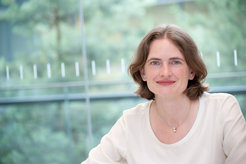Prof. Dr. Tanja Weil

Prof. Dr. Tanja Weil wurde 2017 als eine der Direktoren des Max-Planck-Instituts für Polymerforschung in die Max-Planck-Gesellschaft berufen und leitet den Arbeitskreis "Synthese von Makromolekülen". Sie studierte Chemie (1993-1998) an der TU Braunschweig und der Universität Bordeaux I (Frankreich) und promovierte am MPI für Polymerforschung unter der Leitung von K. Müllen. Im Jahr 2003 erhielt sie die Otto-Hahn-Medaille der Max-Planck-Gesellschaft. Von 2002 bis 2008 hatte sie verschiedene leitende Positionen bei der Merz Pharmaceuticals GmbH (Frankfurt) von der Bereichsleitung Medizinische Chemie bis zur Direktorin für Chemische Forschung und Entwicklung inne. Im Jahr 2008 nahm sie eine Stelle als Associate Professor an der National University of Singapore an. Tanja Weil kam 2010 als Direktorin des Instituts für Organische Chemie III / Makromolekulare Chemie zur Universität Ulm. Sie hat zahlreiche Wettbewerbsbeiträge auf nationaler und internationaler Ebene erhalten, darunter einen Synergy Grant des European Research Council (ERC). Sie ist in vielen Beiräten und Steuerungsgremien tätig: Sie ist Mitglied des Senats der Deutschen Forschungsgemeinschaft, Mitglied des Senats der Leibniz-Gemeinschaft und der Leibniz-Bewertungsgruppe. Tanja Weil ist Mitherausgeberin bei JACS und Mitglied des Redaktionsbeirats von ACS Nano. Ihr wissenschaftliches Interesse gilt innovativen Synthesekonzepten zur Herstellung funktioneller Makromoleküle und Hybridmaterialien zur Lösung aktueller Herausforderungen in der Biomedizin und Materialwissenschaft.
Ausgewählte Auszeichnungen
2022 | Laureate Dr. Manfred-Jäger-Symposium, Heinrich-Heine-University Düsseldorf |
2022 | 2022 Annual Warwick Polymer Chemistry International Lectureship |
2020 | Netherlands Scholar Award for Supramolecular Chemistry, February 2020 |
2017 | Honorary Professor Johannes Gutenberg University Mainz |
2016 | Honorary Professor Ulm University |
2014 | Bruno-Werdelmann-Lecture of the University Duesburg-Essen, Germany |
2013 | Solvay Colloquium, Brussels, Belgium |
2012 | Synergy Grant of the European Research Council (ERC) |
2002 | Otto Hahn Medal of the Max Planck Society, Germany |
Ausgewählte Aktivitäten & Errungenschaften
2022– | University Council Member of Ulm University |
2022– | Advisory Board Member for Biotechnology of the State of Rhineland-Palatinate |
2021 – | Fellow of the executive Board of the Max Planck School Matter to Life (MtL) |
2021– | Associate Editor, Journal of the American Chemical Society, ACS |
2020– | Board Member of the Mildred Scheel Foundation for German Cancer Research (Vorstandsmitglied der Mildred Scheel Stiftung der deutsche Krebshilfe) |
2019– | Director Max Planck-Bristol Centre for Minimal Biology |
2018–2020 | Associate Editor ACS Nano, ACS |
2018–2021 | Editorial Board Member Angewandte Chemie, Wiley |
2017–2025 | Senate Member of the German Research Foundation |
2017– | Steering Committee Member of the Max Planck Graduate Center (MPGC), Mainz, Germany |
2016–2024 | Member of the Senate of the Leibniz Association and member of the evaluation panel |
2015– | Advisory Board Member Advanced Science, Wiley |
